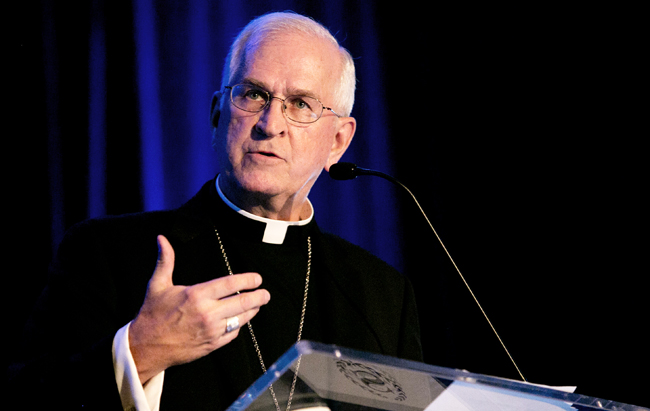WASHINGTON (CNS) — The family is an instrument of evangelization and it can influence others more than people realize, the president of the U.S. Conference of Catholic Bishops, said at The Catholic University of America.
Archbishop Joseph E. Kurtz of Louisville, Kentucky, said families deserve to be held up and supported in their daily lives and that last fall’s extraordinary Synod of Bishops on the family in Rome was designed to ensure that families remain an integral part of church life.
“I think (evangelization and family life) goes hand in hand certainly, this whole idea that the family is not simply an object of our care. The family is what influences neighbors,” he said during a March 16 program tying together last October’s extraordinary Synod of Bishops on the family and the upcoming synod on the family with the new evangelization.
[hotblock]
“Families have a powerful impact even on people who don’t belong to their family. I think the family is being called to be an instrument of the evangelization to participate in that work,” he added.
In a 75-minute discussion with John Grabowski, associate professor of moral theology and ethics at the university and a member of the Pontifical Council for the Family, Archbishop Kurtz offered his insight into last fall’s synod and outlined the core principles that will be part of the synod Oct. 4-25 at the Vatican.
As USCCB president, Archbishop Kurtz is part of the contingent representing the U.S. church at both gatherings.
The archbishop said he focused on three points in addressing the synod:
— The beauty of the teachings of Jesus, especially the beauty of marriage.
— People want to be inspired today and the “lived witness” of marriage can provide that inspiration.
— The church must be able to walk with people who are hurting, especially divorced and civilly remarried Catholics.
“The church has always been at her best when we walk with people, (being) the presence of Jesus to those who are hurting,” he said.
The bishops’ conference president said he hopes that the upcoming synod will inspire families to overcome their fear that they have nothing to offer others.
“Let’s face it, every family is imperfect,” he said. “But every family has an opportunity to witness to the faith. … We have so much. We sometimes don’t give time to people who are the most important in our lives,” he said.
“The most important things are the relationships that we have and so we need to put a priority on the gift of marriage and family.”
As for any reported disagreements that surfaced during the Synod of Bishops, Archbishop Kurtz described the discussions as frank and open, as Pope Francis had suggested in addressing the synod.
“The Holy Spirit works through zeal and passion,” he said.
Archbishop Kurtz noted that honest debates have been occurring within the church since the Council of Jerusalem. The council met around 50 A.D. and Acts of the Apostles and St. Paul’s Letter to the Galatians suggest that it was called to debate whether male Gentiles converting to become followers of Jesus were required to get circumcised.
Archbishop Kurtz noted by the end of the Synod of Bishops that each one of the 62 paragraphs that constituted the final “relatio,” or report, of the two-week synod met with majority approval — all but three of the paragraphs met with approval by at least two-thirds of those voting. The other three received majority approval, he said.
The final relatio is important because it serves as the “lineamenta,” or outline, for the upcoming synod that will continue the work of last fall’s gathering.
“We wanted to leave that synod with the best document possible that was going to serve the church,” Archbishop Kurtz said.
Dioceses across the country have been seeking comment on the lineamenta in recent weeks in preparation for this fall’s Synod of Bishops. Most have had online questionnaires or surveys, inviting interested parishioners, clergy and men and women religious comment. Others have convened diocesan-wide listening sessions.
Local bishops have sought comments on how well people understand church teaching on marriage and family, same-sex relationships, contraception, the annulment process and the church’s response to divorced and civilly remarried Catholics. Some questionnaires have been highly technical in nature, prompting Archbishop Kurtz to say that he felt they could have been simplified so that average parishioners would feel comfortable enough to respond.
The results from dioceses were due at the USCCB March 20, while the Vatican has asked bishops’ conferences to submit their reports by April 15.
The archbishop said that one discussion about the final document revolved around the annulment process and the consensus was that it needed to be streamlined.
The relatio also recognizes that the church must respond in a pastoral manner to people experiencing same-sex attraction, Archbishop Kurtz said.
“Every human being is made in God’s image and likeness and sometimes people forget that. People can be very mean-spirited. So the church has to be strong in saying ‘You know what? Every person is created by God in his image,” he said.
At the same time, he explained, “We cannot change what marriage is. It is a God-given gift that is at the very core of family. It will always be a man and a woman, the two who become one flesh, open to new life.”
PREVIOUS: Catholic college won’t offer federal loans, citing overreaching regs
NEXT: Chrism Mass shows the rich history of ritual oils




Share this story